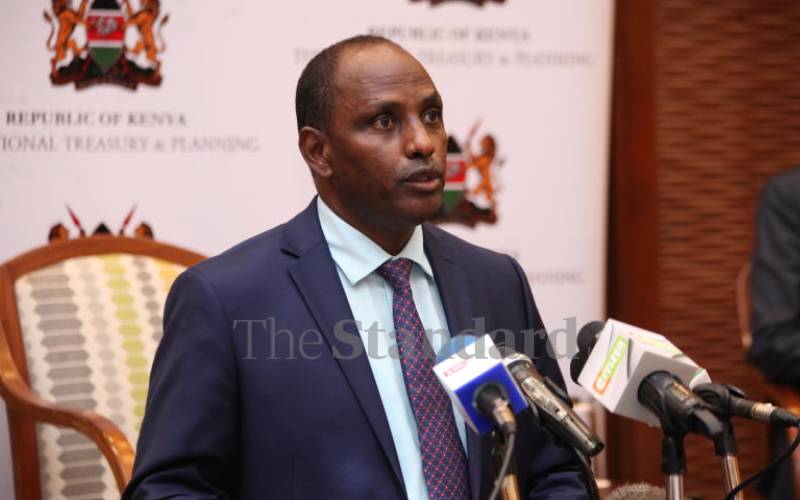
Treasury Cabinet Secretary Ukur Yatani. [Wilberforce Okwiri, Standard]
The International Monetary Fund's (IMF) ultimatum that Kenya reveals the Covid-19 millionaires is just one of the conditions of the Sh256 billion programme that it has with Nairobi.
It is aimed at assisting the country to reduce its debt levels by increasing tax revenues and containing spending.
The target is for Treasury to shrink its Budget hole to Sh663 billion by June 2025. Kenya’s Budget deficit is close to Sh1 trillion.
Thus, as part of containing expenditure, the Washington-based institution asked Kenya to speedily reveal the names of individuals who own firms that supplied Covid-19 equipment to the Kenya Medical Supplies Authority (Kemsa).
The condition does not apply to Kemsa alone but all State agencies, in what is at taming graft and wastage.
Every company contracted by a State agency will also be expected to reveal its beneficial owners in the procurement portal, failure to which they will be locked out of the tender.
If Kenya does not meet this condition, or any other condition, technically known as the structural benchmark, the deal is off.
And if the deal is off, then Kenya will look bad among international investors such as those who recently bought its Eurobond.
Also, some of the fiscal risks that the government faces emanate
from cash-strapped State-owned enterprises (SOEs) such as Kenya Airways.
The IMF fears that such parastatals might go down with the country. Thus, the government is expected to conduct a health check of some 20 SOEs with the goal of restructuring them.
Other than Kenya Airways, other parastatals lined up for restructuring are Kenya Power, Kenya Ports Authority, Kenya Pipeline, Kenya Broadcasting Corporation (KBC), KenGen and public universities.
Some of these companies might be merged as others are dissolved in what resembles the return of the 1990s Structural Adjustment Programmes (SAPs).
In the budget that was read for the financial year ending June 2022, the IMF’s fingerprints were all over. The introduction of e-procurement is an IMF-led recommendation aimed at ensuring efficiency in the procurement process.
The IMF deal has also seen civil servants and teachers being denied a salary increment. Moreover, the IMF has proposed that Kenya apply the full 16 per cent value-added tax (VAT) to petroleum products from the current eight per cent.
Treasury Cabinet Secretary Ukur Yatani is also not happy with the National Assembly after it scuttled plans that Treasury had with the IMF to reduce tax expenditures by reducing zero-rating expenditures.
Normally, when a product is zero-rated, it means that suppliers can claim a refund from the National Treasury, a situation that has seen the Exchequer pay close to Sh560 billion in tax refunds.
Yatani described this as unfair to companies which, for one reason or the other, can’t claim the refunds. He said some of those benefits are not even passed on to consumers.
What CS Yatani never said is that under the deal with the IMF, the government is expected to start publishing an annual report on tax refunds and the effect they have on the Budget.

No comments:
Post a Comment